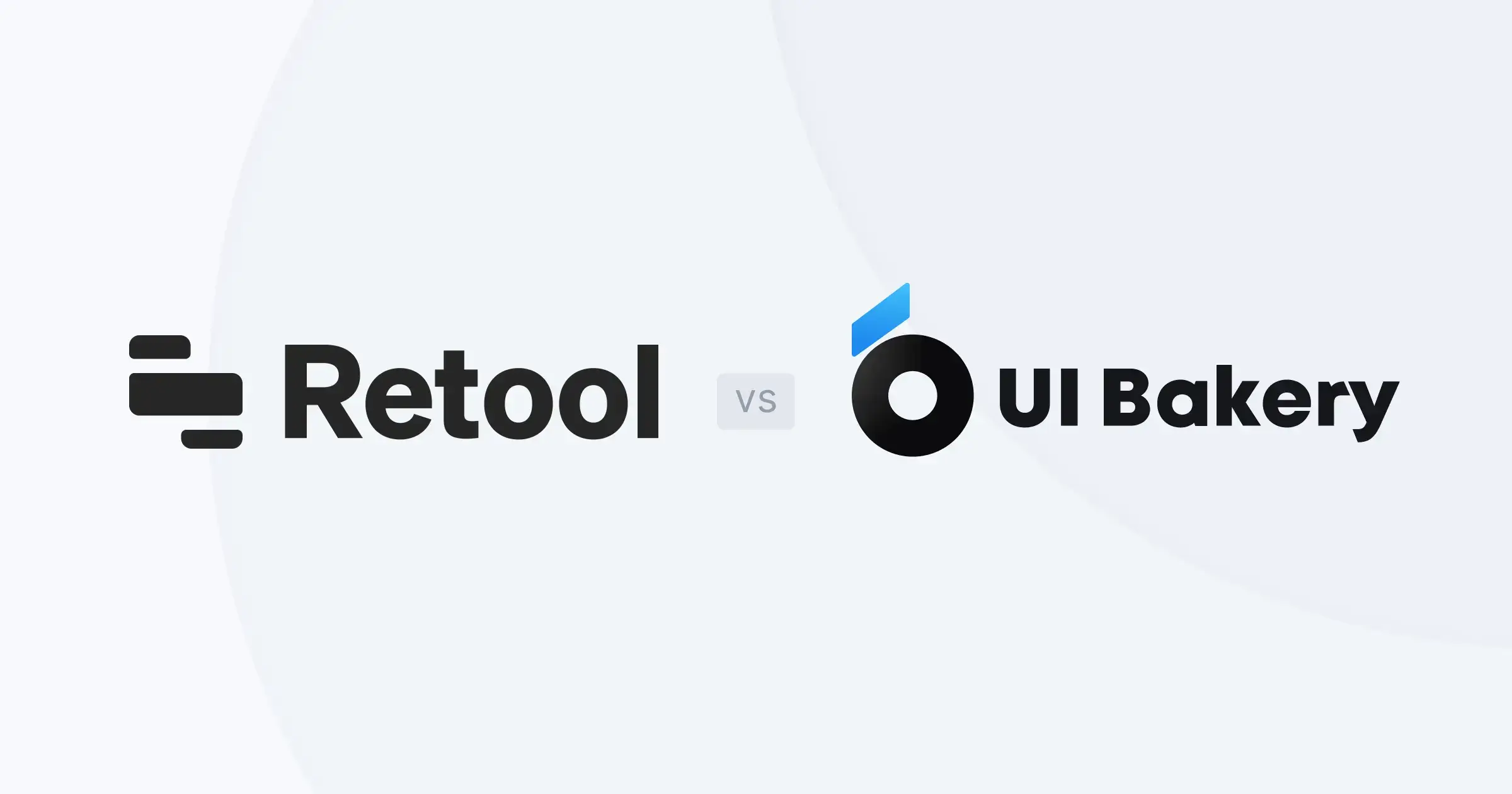
Retool competitors: Low-code platforms overview (2025)
Retool is a popular choice for building internal tools quickly with low code. But if you're reading this, you might be feeling a bit stuck. Maybe the cost, complexity, or missing features aren't quite the right fit.
This article provides an overview of the competitive landscape for low-code tools similar to Retool in 2025, offering a general comparison of business details, pros and cons, pricing, and functionality. For a more detailed analysis of Retool alternatives, visit this article.
UI Bakery
Need a better way to build internal tools than Retool? Look no further than UI Bakery.
It offers similar features, but with a focus on streamlining the development process, especially for small and medium-sized enterprises in need of enterprise-level functionalities like advanced roles, permissions, and single sign-on (SSO), yet constrained by budget limitations that make Retool's enterprise version unfeasible.
👤 Employees on LinkedIn: 14
💸 ZoomInfo revenue: $1M+
🔝 Crunchbase rank: 221,814
🚀 Vendor employee growth: 48.8
🌳 Year founded: 2018
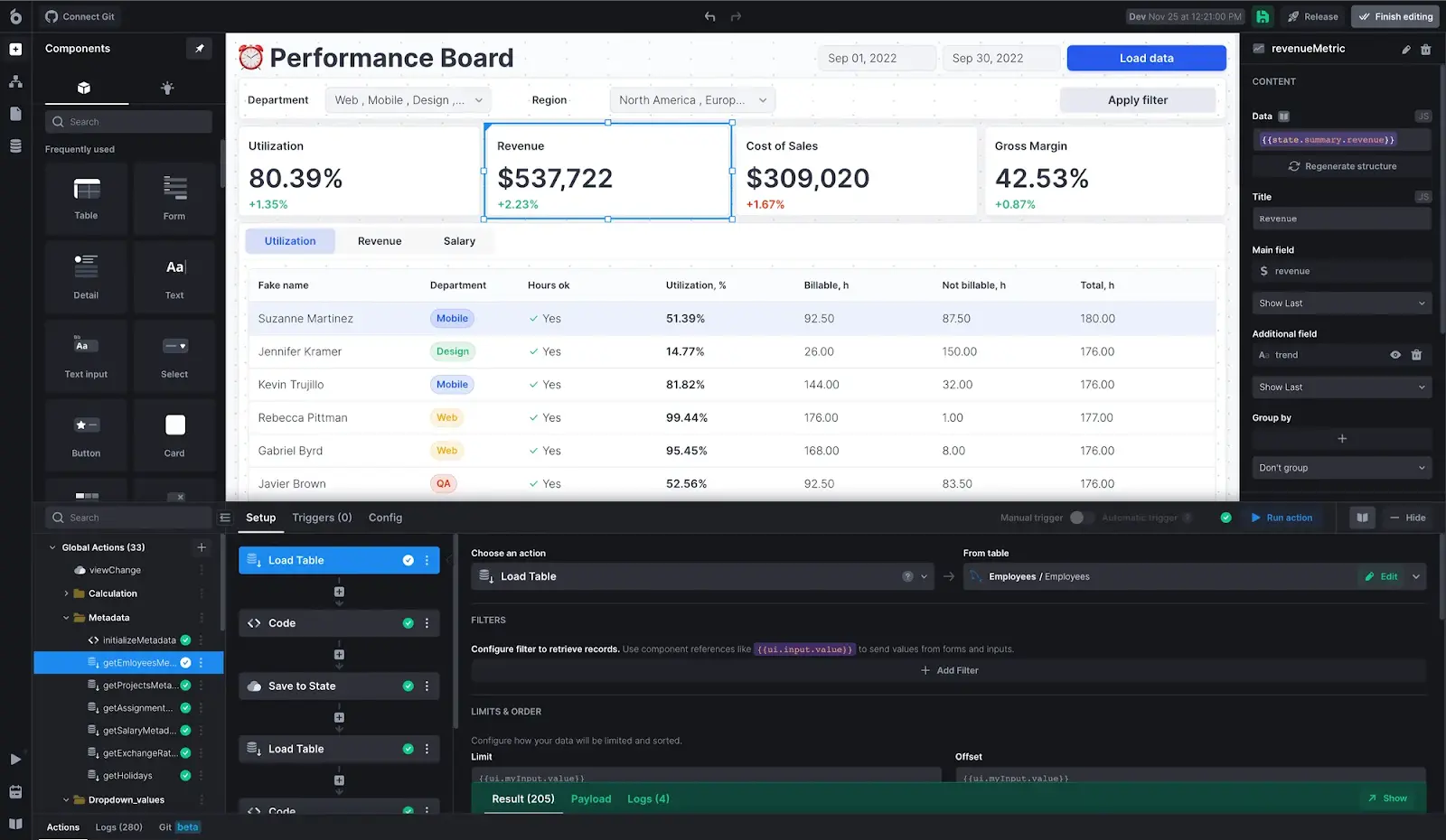
Pros
- Great development experience and performance of drag’n’drop builder.
- Workflow Automations feature that allows to run scheduled jobs and web hooks.
- Git integration.
- AI Assistant that helps with development.
- Multiple action steps within a single action.
- Multiple pages within a single app.
- More advanced level of roles management for the lower-price than Retool.
- Easy-to-use custom theming and white-labeling capabilities.
- Fair pricing model, that allows an affordable start even with lots of users.
- Server actions allow to execute workflows securely on the backend.
Cons
- Not as many native data source connections, though has all most commonly used.
- Not as many embedded components as Retool has.
- Not an out of the box integration with a testing framework.
Pricing
- Free plan: $0/month/user
- Standard plan: $5/month/user; $10/month/developer
- Business plan: $10/month/user; $40/month/developer
- Shared Permission Group (unlimited users at a fixed fee): $250/month
- Enterprise plan: Custom pricing
Ratings and reviews
Retool’s rating is 4.9 out of 5 and based on 40 reviews on G2.
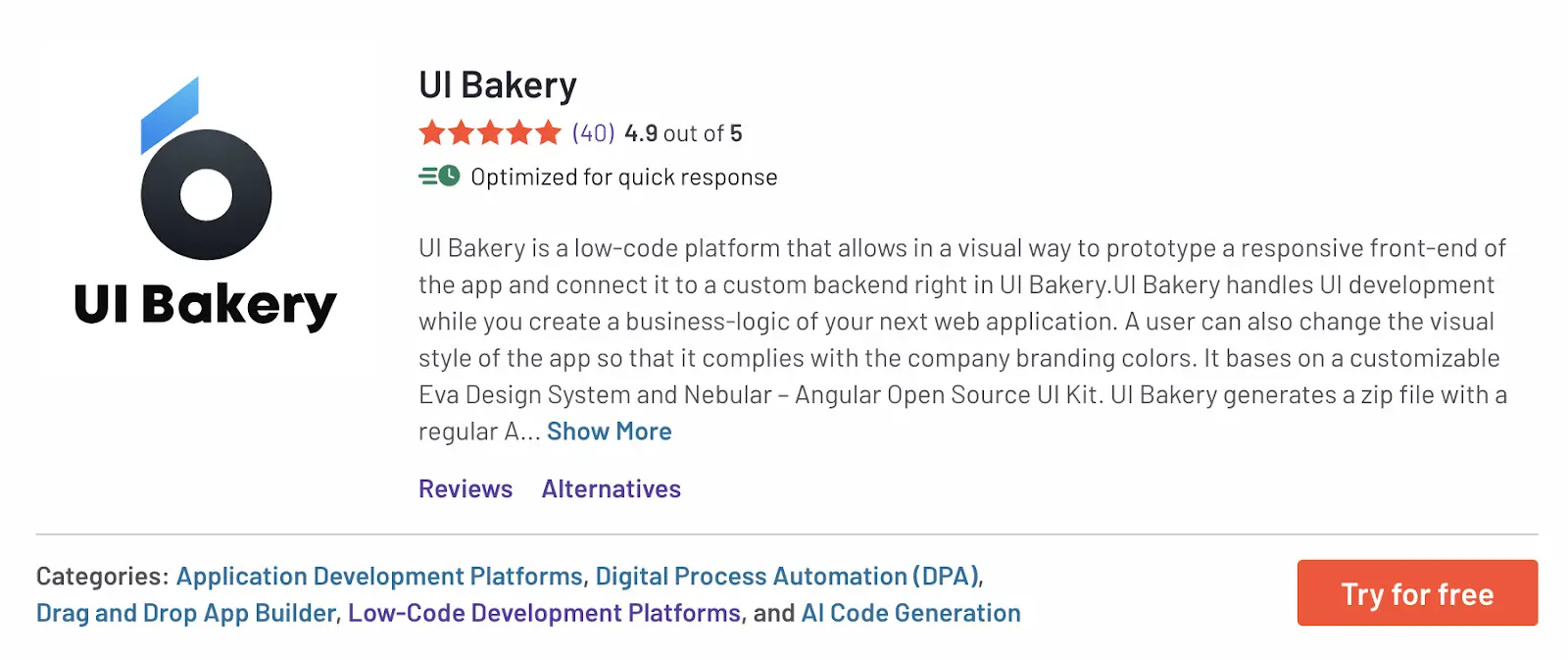
Appsmith
Appsmith stands out as another competitor to Retool, sharing many similarities with its counterpart. Initially crafted as an open-source solution, it boasts a thriving community.
👤 Employees on LinkedIn: 95
💸 ZoomInfo revenue: $22.1m
🔝 Crunchbase rank: 53,751
🚀 Vendor employee growth: 0.0
🌳 Year founded: 2019
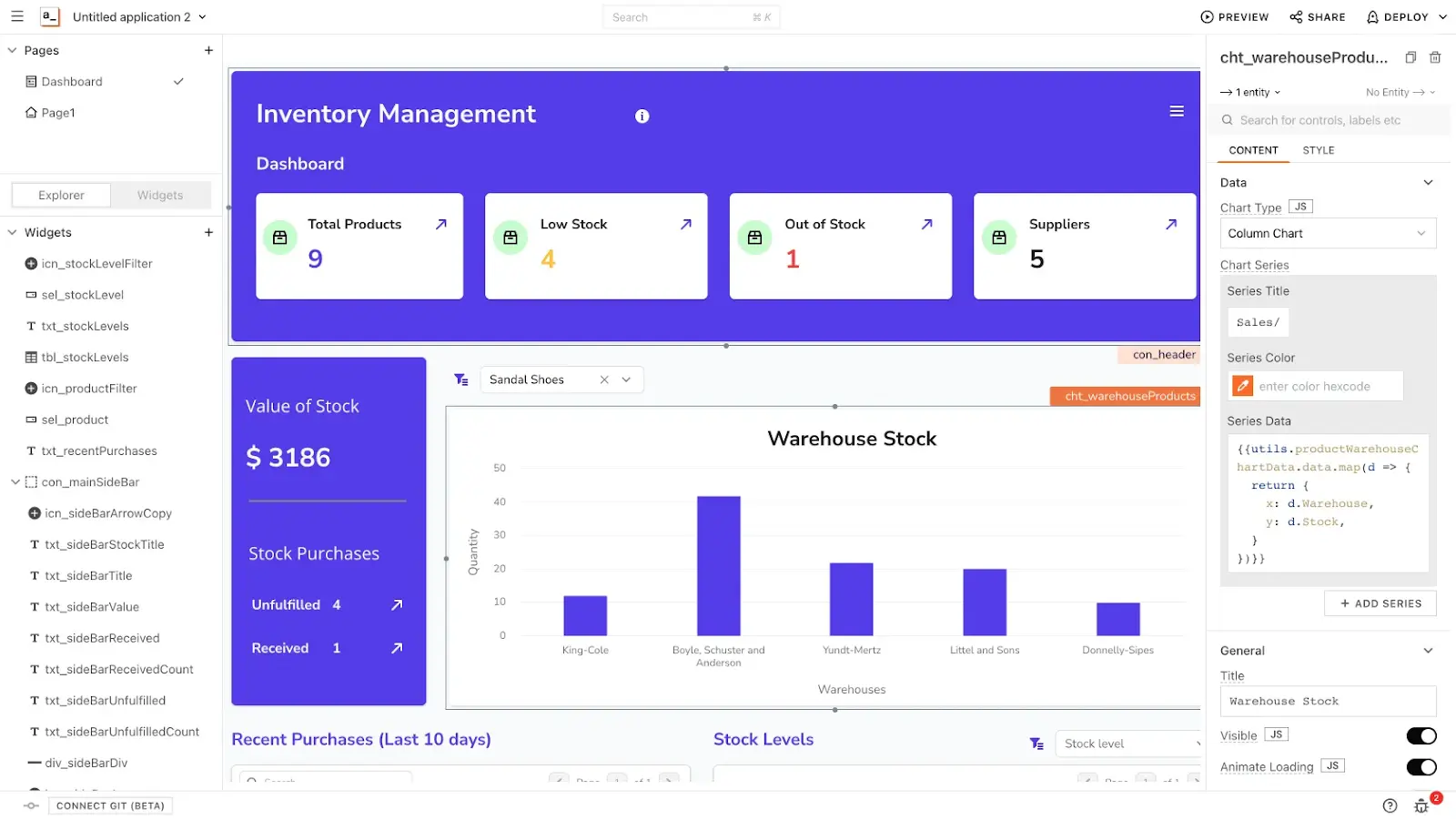
Pros
- Open-source, which means that other developers can potentially audit the code they write.
- Large community on GitHub.
- Git integration.
Cons
- Not a transparent pricing model. It’s really hard to predict the final product price, especially with per hour/per user approach.
- UI builder might be buggy sometimes.
- Only sample databases.
- Not as many embedded components as Retool and UI Bakery have.
- Not as many native data source connections, though it is almost commonly used.
- No Workflows/Automation feature.
- No Environments feature
- The more components the app has, the slower it works.
Pricing
- Free plan: $0/month/any user.
- Business plan: $0.40/hour/user (capped at $20/user/month).
- Enterprise plan: Customized for large teams that need more security and scalability.
Ratings and reviews
The rating for Appsmith is 4.7 and based on 53 reviews on G2.

Budibase
Budibase represents another low-code offering with distinctions in external and conceptual aspects compared to Retool. However, it doesn't closely compete with Retool in terms of feature breadth.
👤 Employees on LinkedIn: 22
💸 ZoomInfo revenue: -
🔝 Crunchbase rank: 97,743
🚀 Vendor employee growth: 0.0
🌳 Year founded: 2019
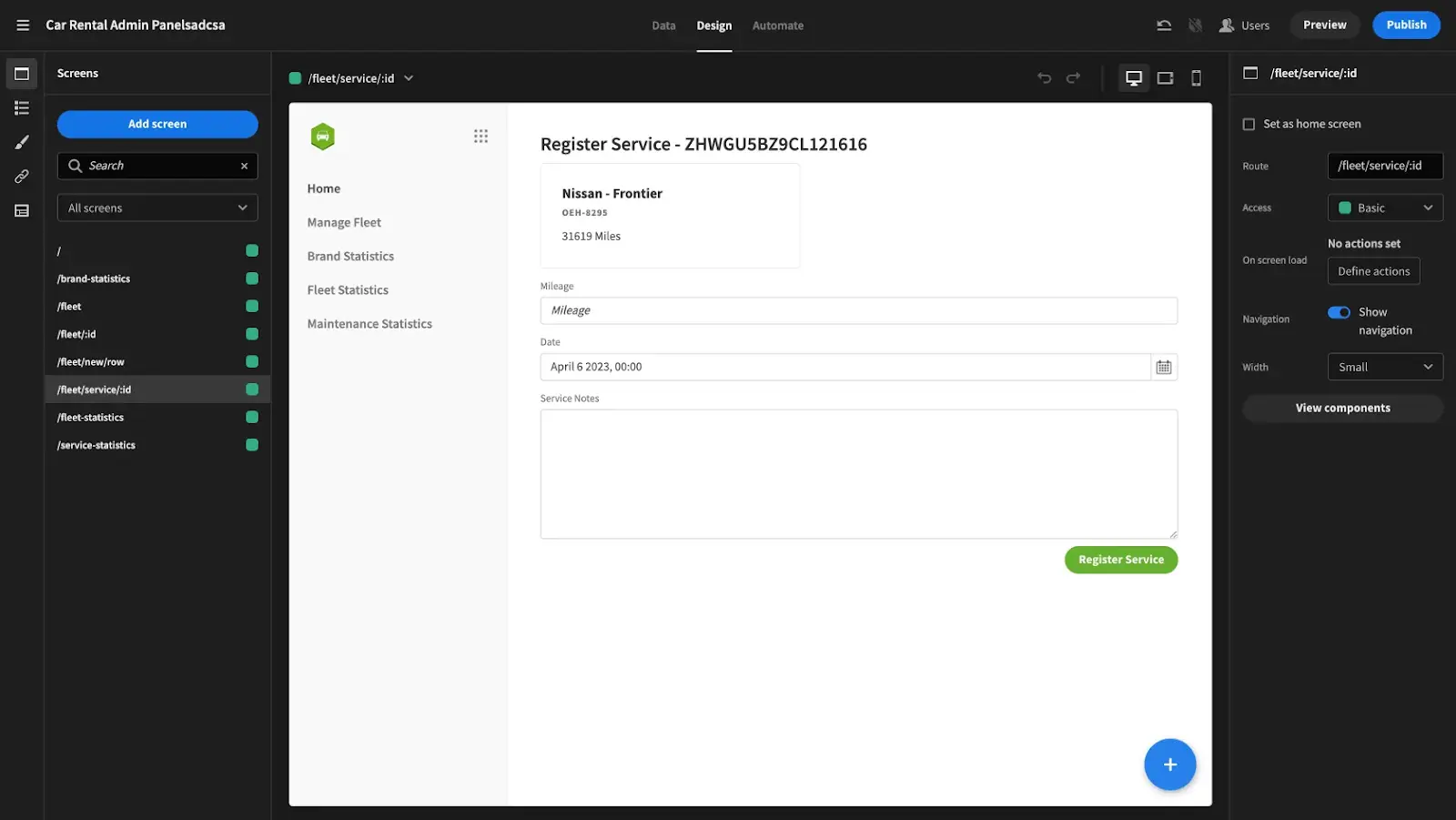
Pros
- Implements some no-code concepts that allow people without coding skills to build internal apps.
- Though sometimes it is implemented quite user-unfriendly.
- Embedded DB.
- Workflows/Automation feature.
Cons
- The application's pricing model is per user. While it is cheaper than Retool's, it might still be quite cost-inefficient for larger teams, especially with infrequent users. Moreover, there are several restrictions imposed on the number of logs, automations, and applications, which may add to the difficulty of calculating the overall pricing.
- UI builder doesn’t have an absolutely positioned canvas for elements, which complicates the process of UI composition. Canvas is slow and buggy.
- Requires learning additional concepts, e.g. data providers.
- No Git integration.
- No query/action performance information.
- The system for creating queries and automations is not very user-friendly. They are jumbled and you have to work in a lot of narrow overlay windows.
- Small amount of native data source connections.
- Small amount of embedded components.
Pricing
- Free plan: $0/month/user
- Premium plan: $60/month/app creator; $6/month/app user
- Enterprise plan: Custom price for maxed up security and support
Ratings and reviews
The rating for Budibase is 4.5 and based on 71 reviews on G2.
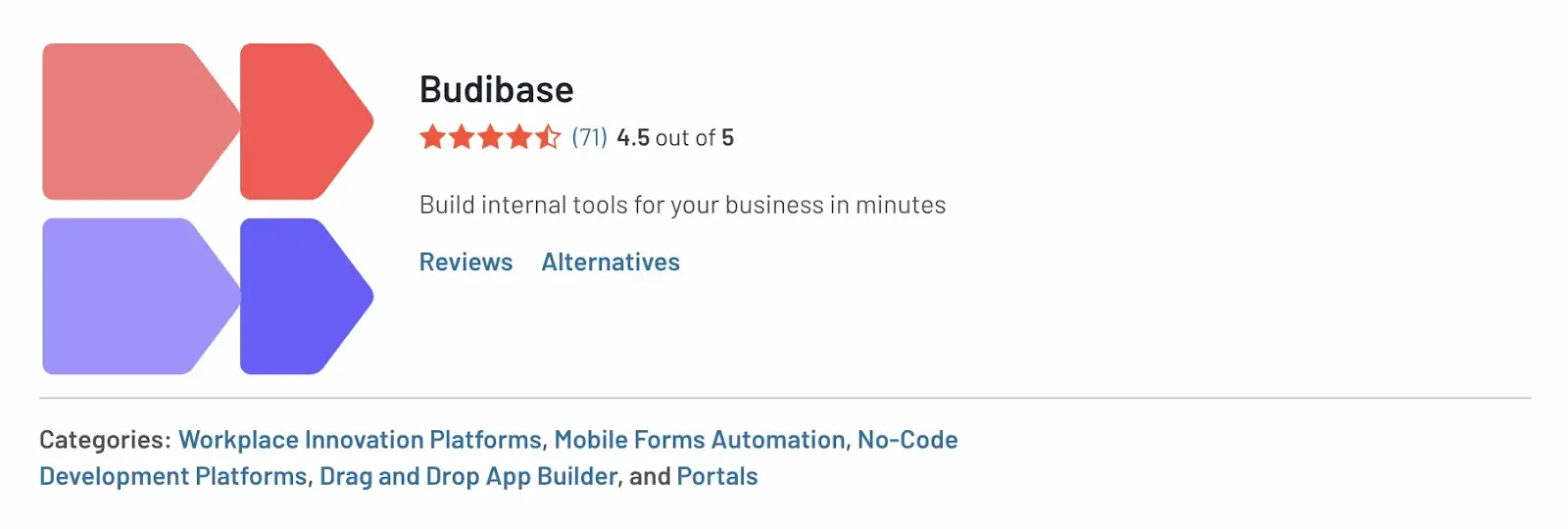
DronaHQ
With a notable footprint in the low-code and no-code domain, DronaHQ has been primarily focused on providing a mobile-friendly user experience. However, it is now evolving into a more comprehensive platform capable of generating internal applications.
👤 Employees on LinkedIn: 72
💸 ZoomInfo revenue: $6.88m
🔝 Crunchbase rank: 5,4655
🚀 Vendor employee growth: 31.0
🌳 Year founded: 2007
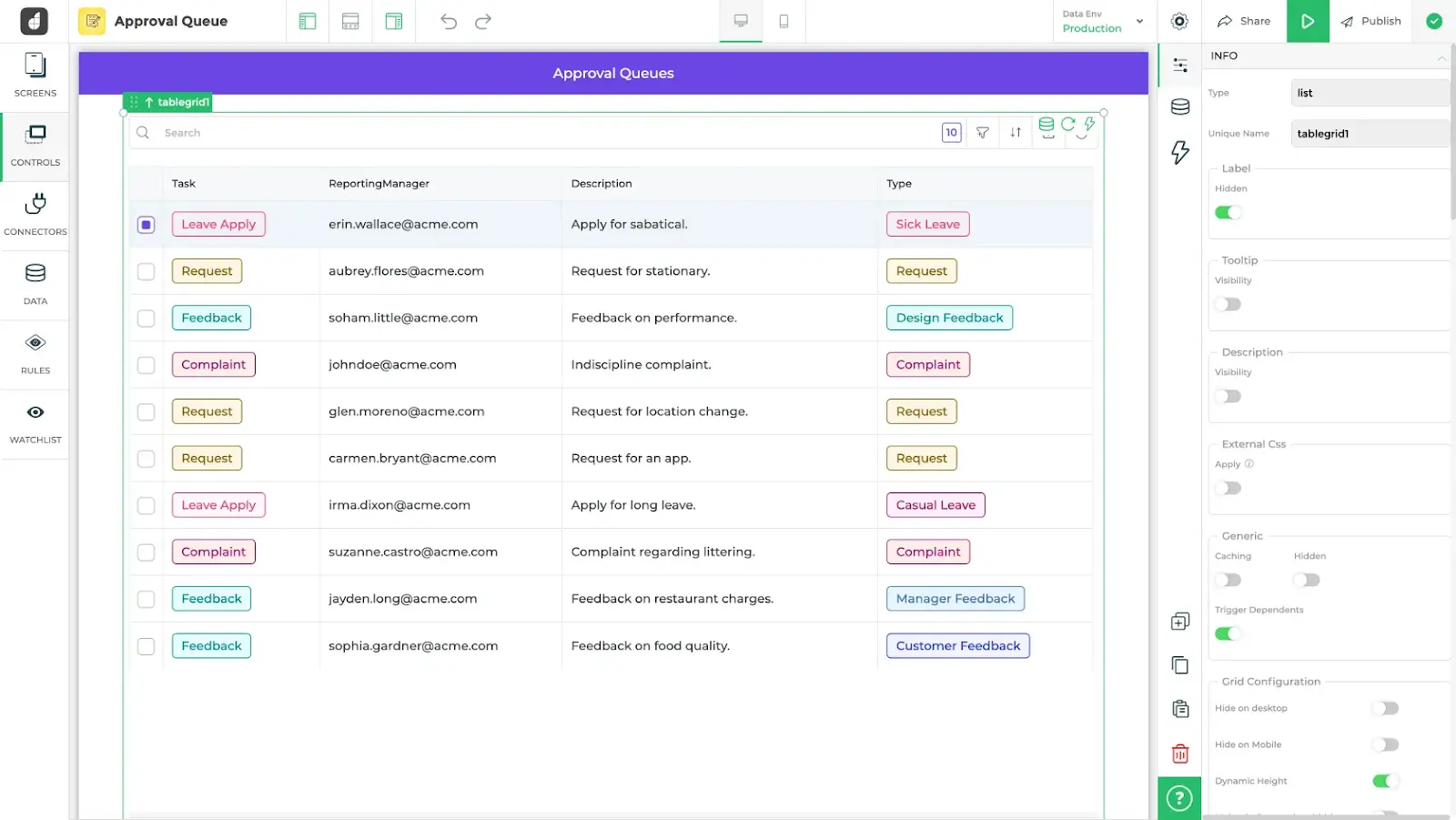
Pros
- The largest amount of data sources and 3rd-party services.
- The largest amount of components.
- Performance information only on the connector level
- Git integration.
- Workflows/Automation feature.
Cons
- UI builder canvas has usability issues.
- The end-user UI is large in size.
- The layout can be cluttered and confusing due to the excessive number of small sidebars and panels. Some settings are arranged in a chaotic manner.
- Cloud instance may have performance issues.
- Not advanced level of roles management like Retool has.
- Developers and end-users are priced equally, which reduces the cost efficiency for large user bases.
Pricing
- Starter plan: $10/month/user
- Business plan: $25/month/user
- Enterprise plan: Specialized price plans for large businesses.
Ratings and reviews
The rating for DronaHQ is 4.4 and based on 39 reviews on G2.
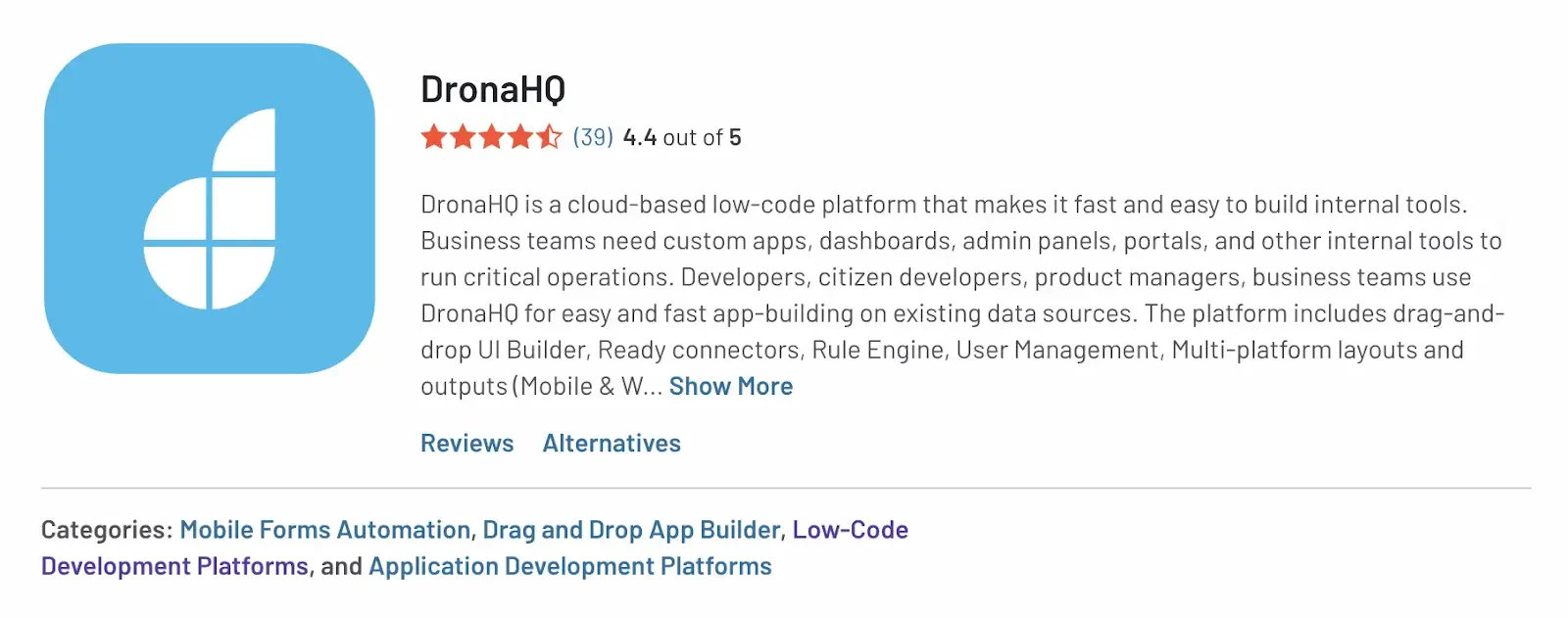
Superblocks
Superblocks vs Retool offers an enterprise-ready, limitless low-code platform designed for crafting customized internal applications, automated workflows, and scheduled tasks. Developers have the flexibility to endlessly expand Superblocks with code, enabling the delivery of high-performance apps at scale, seamlessly adopted throughout their organization.
👤 Employees on LinkedIn: 53
💸 ZoomInfo revenue: $1.33m
🔝 Crunchbase rank: -
🚀 Vendor employee growth: 71.3
🌳 Year founded: 2021
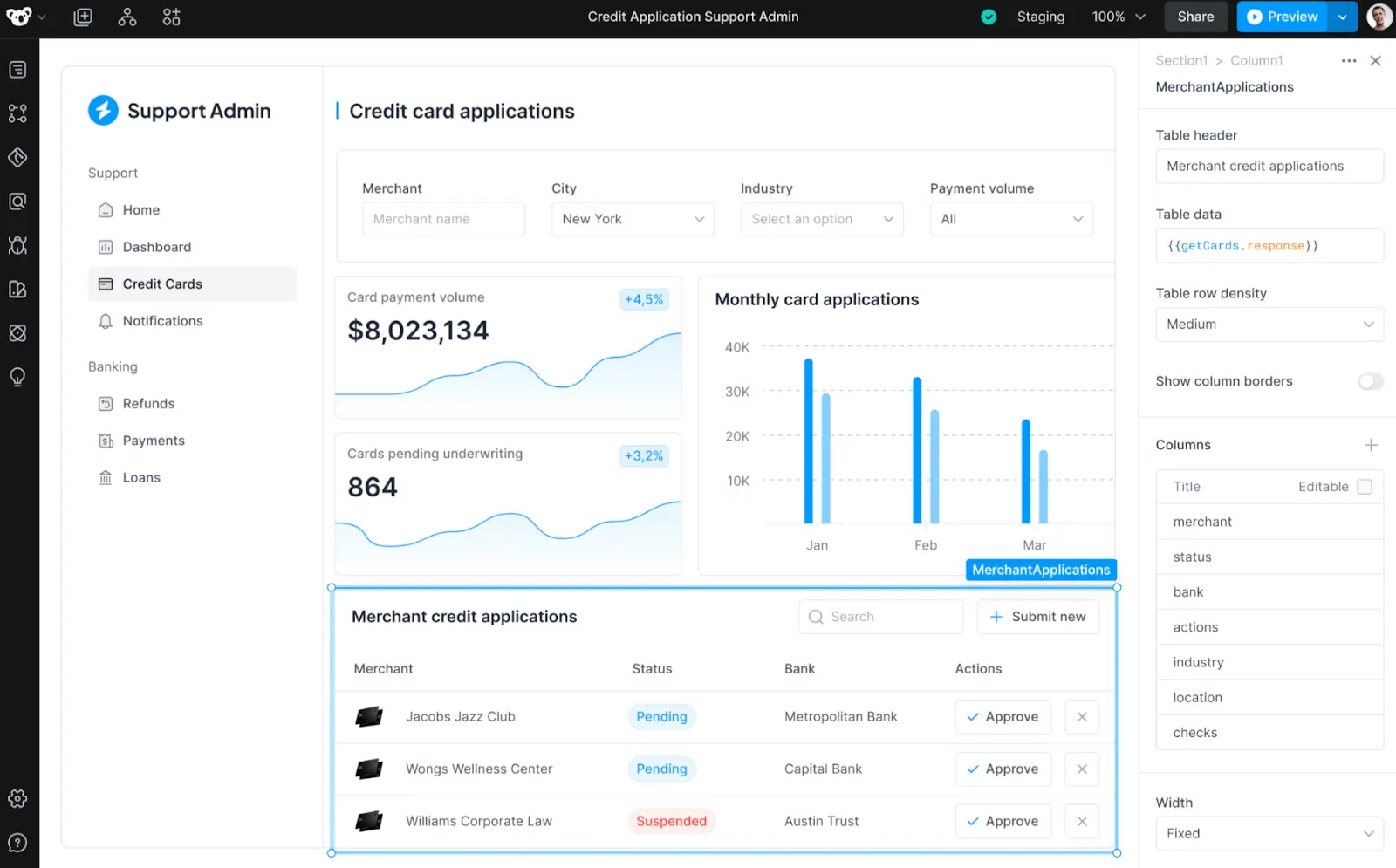
Pros
- Allows complex backend APIs with NodeJS and Python, leverage Javascript on the front-end, and build custom components with React within their own IDE and filesystem.
- Multi-threaded front-end for smooth UI rendering.
- Superblocks AI Copilot with support to generate, explain, and debug.
- Available both as On-Premise Agent a Cloud App Builder.
- Integrates with observability providers like Datadog, Splunk and New RelicSupports event-driven architectures like Kafka, Confluent, and Kinesis.
- Offers usage-based pricing.
Cons
- Components library is quite tiny.
- No Workflows support for scheduled jobs and webhooks
- Exists only a couple years, meaning not mature enough.
- No support for responsive apps.
- Git integration is only at basic support.
- Doesn’t support an air-gapped deployment.
Pricing
- Free plan: $0/month/user
- Business plan: $70/month/creator; $21/month/user
- Enterprise plan: Custom pricing plan.
Ratings and reviews
The rating for Superblocks is 4.7 and based on 157 reviews on G2.
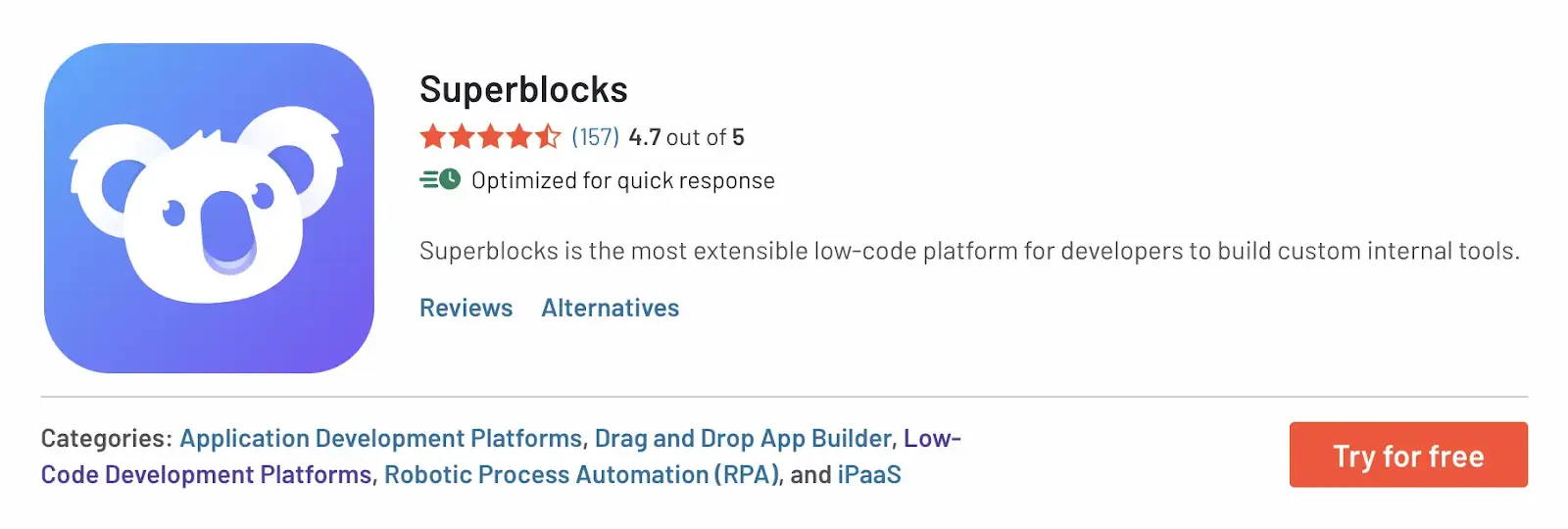
ToolJet
ToolJet brands itself as an open-source alternative to Retool. While it has adopted certain concepts from Retool, its execution may suffer from quality issues despite being available for free.
👤 Employees on LinkedIn: 52
💸 ZoomInfo revenue: $2.1m
🔝 Crunchbase rank: 104,260
🚀 Vendor employee growth: 76.3
🌳 Year founded: 2021
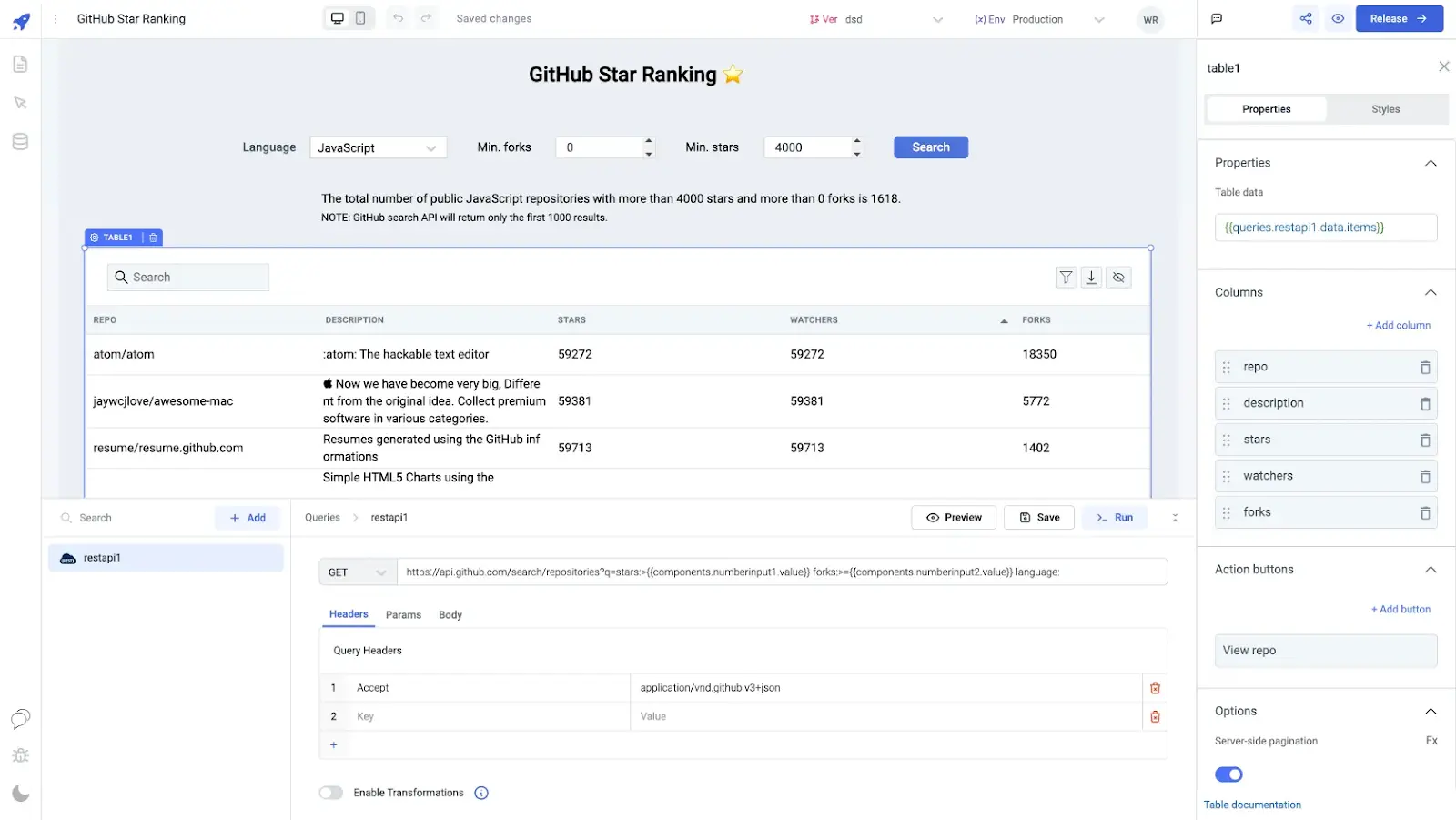
Pros
- Embedded DB.
- Open-source, which means that the other developers can potentially audit the code they write.
- Has a free version for self-hosting.
- Has light and dark UI builder mode.
Cons
- UI builder has a buggy canvas with overlaps.
- Though it has a decent number of components and data sources, often they lack configuration capabilities.
- Git sync has no branches support.
- No query/action performance information.
- Has issues with the quality of the builder.
- No Workflows/Automation feature publicly available.
Pricing
- Basic plan: $0/month/builder; $0/month/end user
- Business plan: $30/month/builder; $10/month/end user
- Enterprise plan: Custom pricing that matches customer’s needs.
Ratings and reviews
The rating for ToolJet is 4.8 and based on 33 reviews on G2.
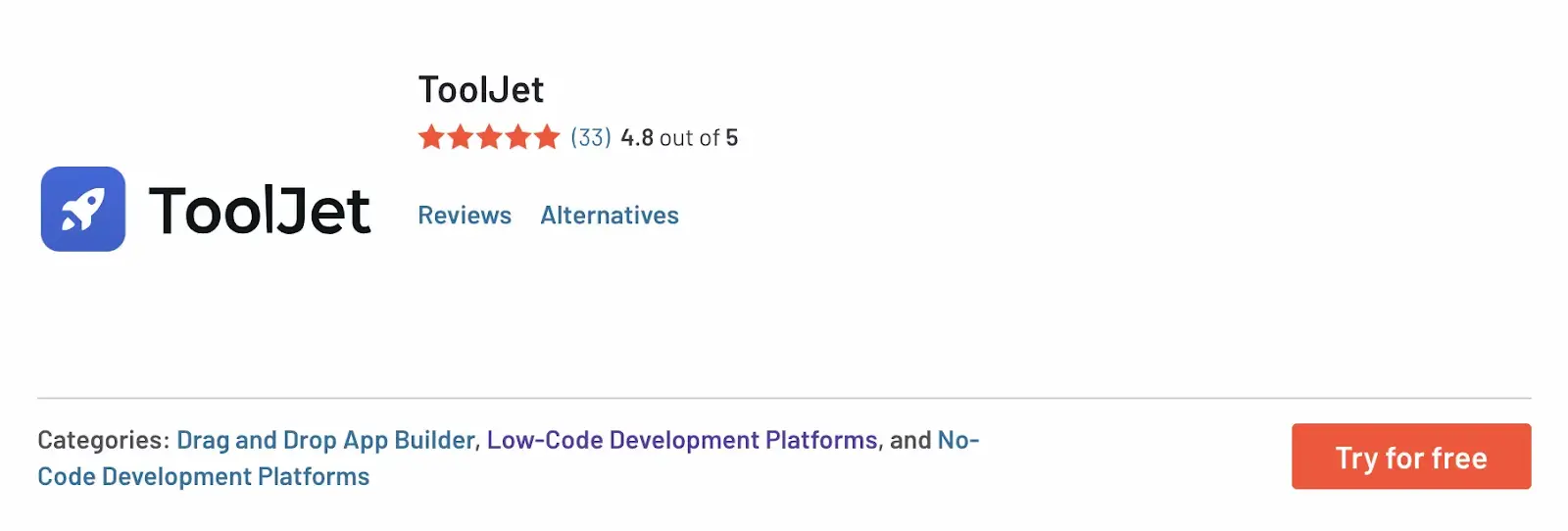
Jet Admin
Jet Admin stands as yet another illustration of a no-code internal tools builder. With this platform, users can effortlessly craft internal tools devoid of any coding requirements.
👤 Employees on LinkedIn: 6
💸 ZoomInfo revenue: $3.8m
🔝 Crunchbase rank: 73,113
🚀 Vendor employee growth: -
🌳 Year founded: 2018
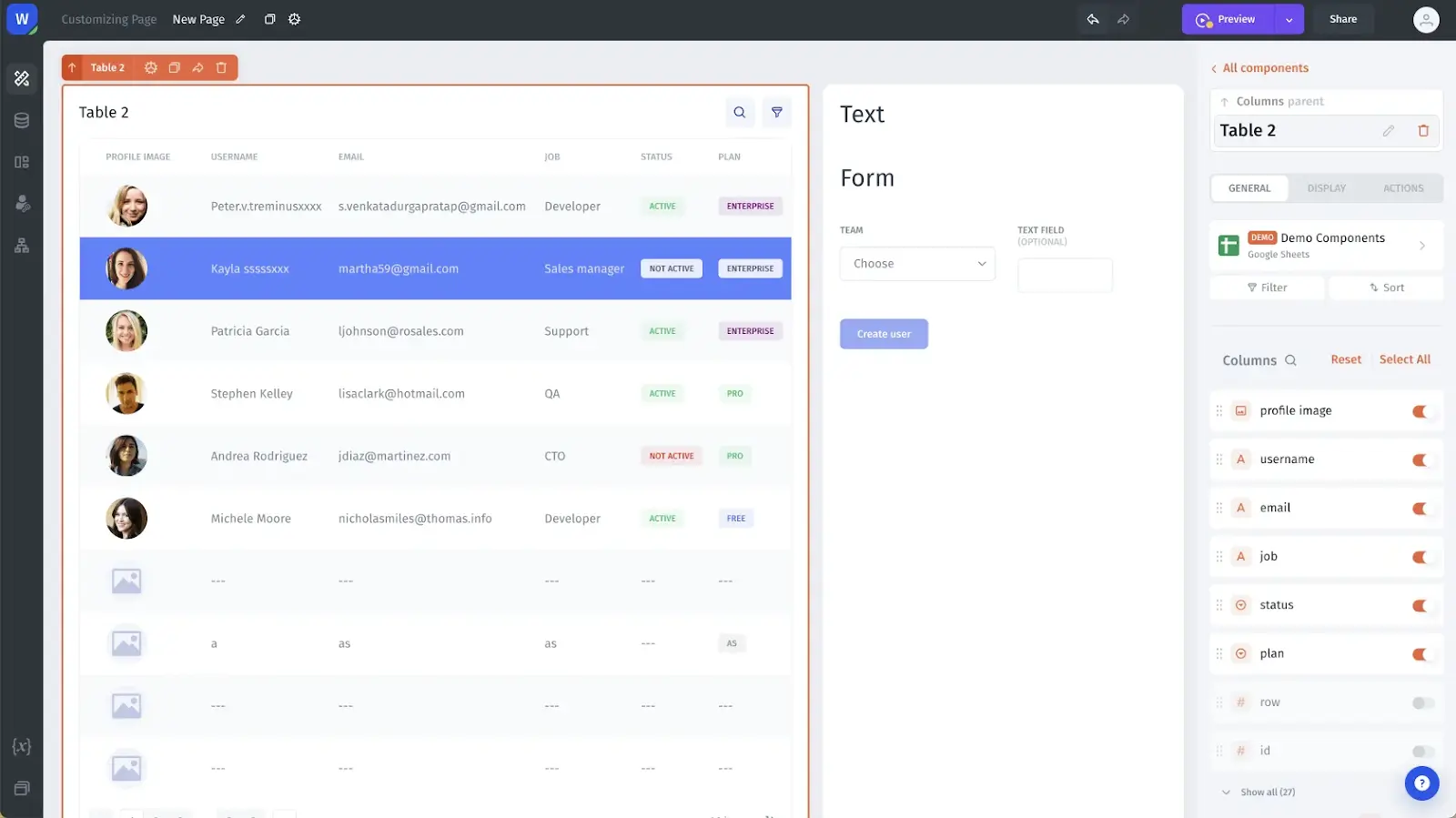
Pros
- No coding skills required for building UI. But it is necessary to be familiar with the general concepts.
- Easy to build CRUD apps.
- Workflows/Automation feature.
- Nice looking UI, but is too large for business apps.
Cons
- Rather large limitations for creating applications because of the no-code approach.
- Vertically stacked and container based drag'n'drop - a rather atypical method of constructing an interface that differs from other similar applications.
- No Git integration.
- No query/action performance information.
- The price for a minimum plan is quite high. Besides that with a lot of apps and users, the cost might scale rapidly.
Pricing
- Starter plan: $49/month/500 users
- Plus plan: $149/month/500 users
- Pro plan: $349/month/per 500 users
- Enterprise plan: $799/month/per 500 users
Ratings and reviews
The rating for Jet Admin is 4.2 and based on 6 reviews on G2.

Mendix
Mendix is a low-code platform that allows the rapid creation and deployment of applications, focusing on collaboration between business and IT teams. Mendix competes with other platforms with its comprehensive set of tools and enterprise-grade features, including robust cloud-native architecture and integration capabilities.
👤 Employees on LinkedIn: 1,268
💸 ZoomInfo revenue: $333m
🔝 Crunchbase rank: 106,813
🚀 Vendor employee growth: 0.0
🌳 Year founded: 2005
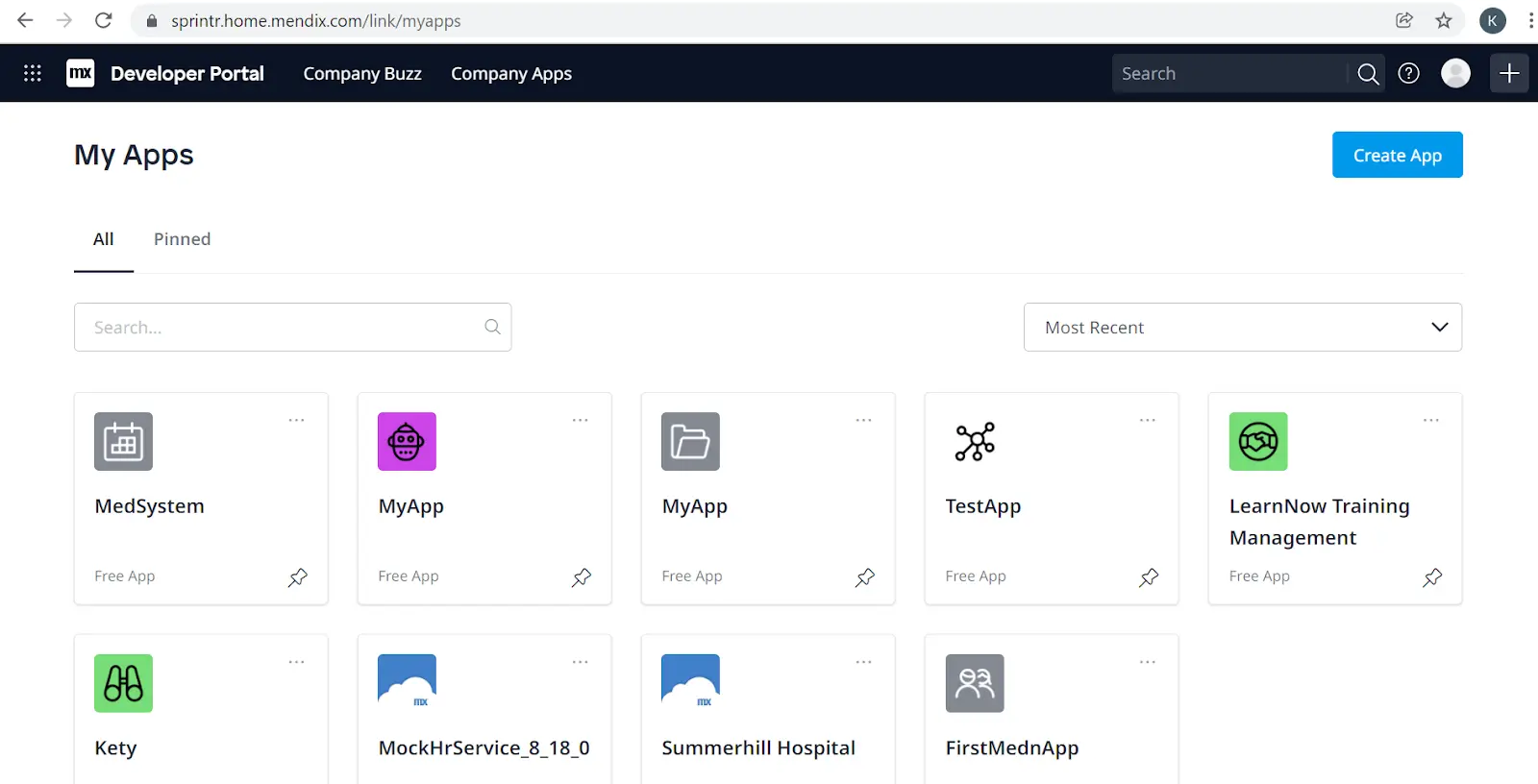
Pros:
- User-friendly interface
- Suitable for non-technical users and developers alike
- Strong focus on collaboration between IT and business teams
- Allows to speed up development and deployment cycles
- Flexibility in cloud deployments and integrations with various services
- Rich integration set
- Access the Mendix Marketplace
- Automated testing and debugging
Cons:
- Mendix can be expensive, particularly for small and medium-sized enterprises
- Mendix is great for small-to-medium-sized projects, but large-scale enterprise-level applications may require significant customization
- There can be a learning curve in adopting the low-code approach and for advanced features
- May have performance issues with complex applications
Pricing:
- Free: €0/month
- Basic: from €52.50/month
- Standard: from €900/month
- Premium: Custom pricing
Ratings and reviews:
The rating for Mendix is 4.4 and based on 179 reviews on G2.

OutSystems
OutSystems is another well-known low-code platform, particularly suited for developing complex, enterprise-grade applications. It emphasizes high-performance, secure, and scalable solutions.
👤 Employees on LinkedIn: 2,024
💸 ZoomInfo revenue: $315m
🔝 Crunchbase rank: 720
🚀 Vendor employee growth: 0.0
🌳 Year founded: 2
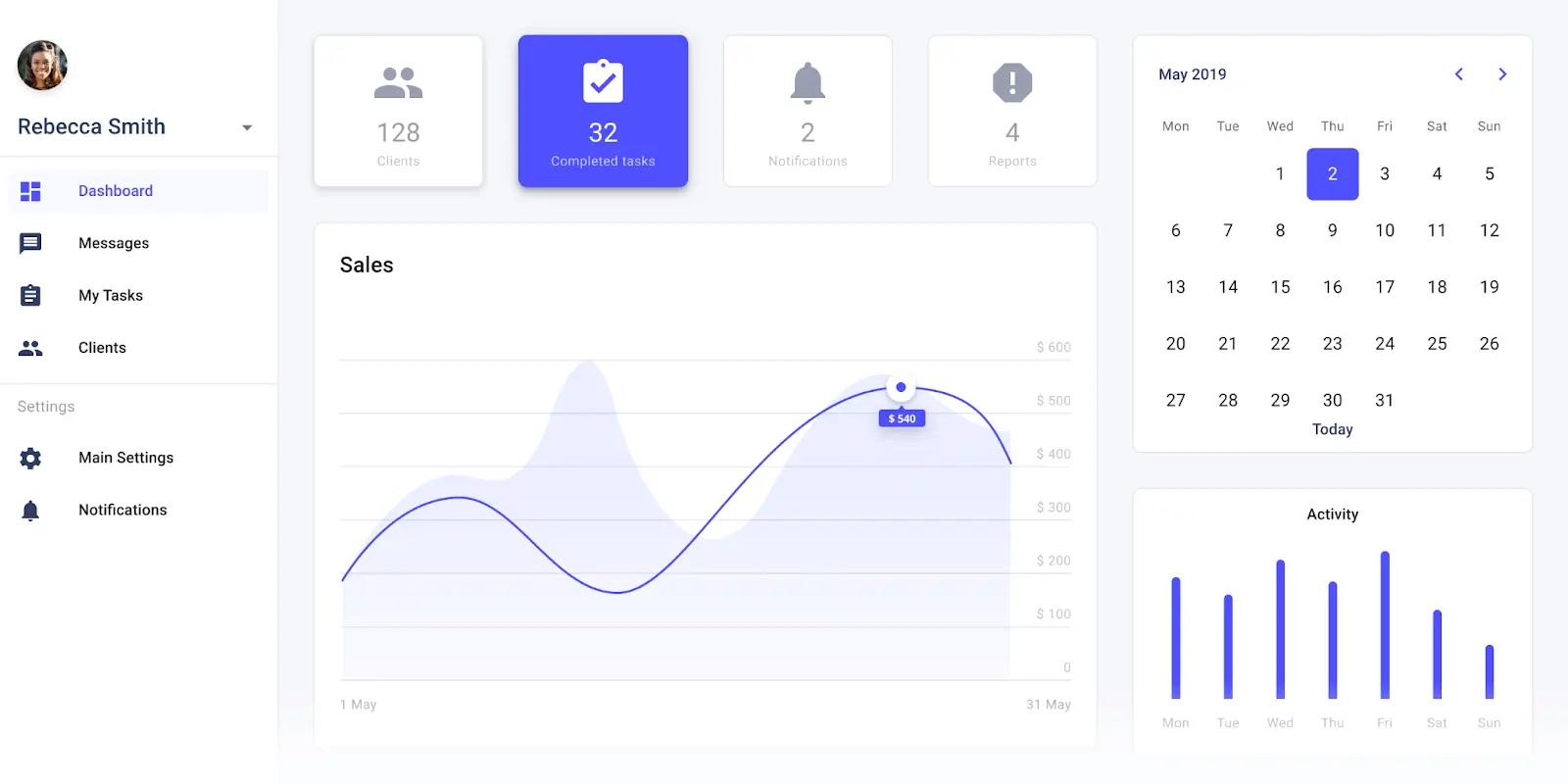
Pros:
- Strong support for large-scale, enterprise-level applications with complex requirements.
- Can handle high-performance demands and large user bases.
- Extensive Integration list
- Built-in DevOps and lifecycle management tools
- AI-powered developments
- Suits for non-developers and tech users
- Drag-and-drop development environment
Cons:
- OutSystems is generally considered expensive, particularly for smaller organizations.
- Although having visual development, it could be hard to understand for users with no technical backgrounds
- The depth of features results in a steeper learning curve, especially for those new to low-code platforms.
Pricing:
- Personal edition: $0/month
- Developer cloud: from $36,300/year
Ratings and reviews:
The rating for OutSystems is 4.6 and based on 1044 reviews on G2.
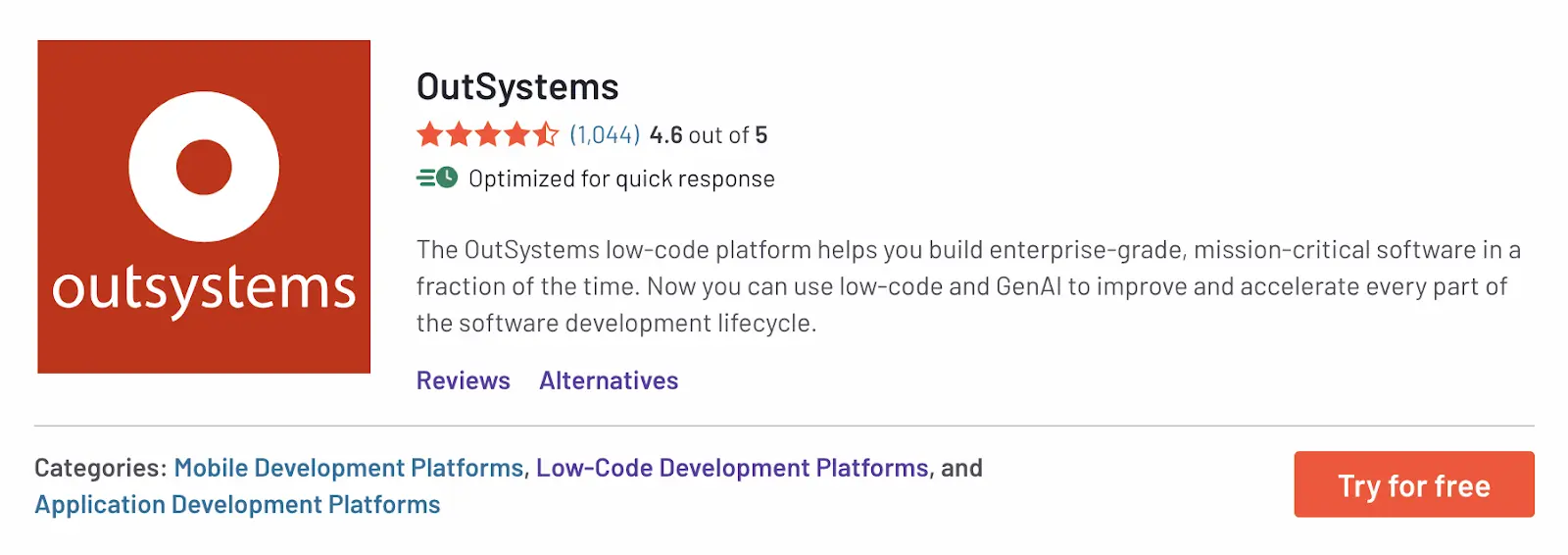
To sum it all up
After comparing Retool's alternatives, it's clear that each tool offers different advantages and drawbacks. The flexibility and speed of low-code platforms make them a great option for many development projects.
Among these options, UI Bakery shines the brightest. It combines user-friendly features with powerful functionality, making it the most comprehensive and approachable solution available.
Not sure which low-code platform is right for you? Let UI Bakery's tech experts help! Just contact us to discuss your needs.




